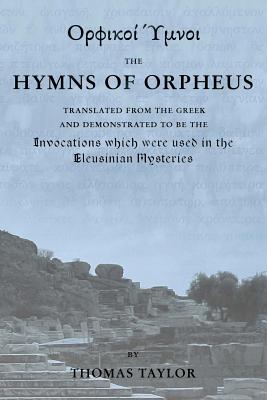The Mystical Hymns of Orpheus: The Invocations used in the Eleusinian Mysteries

The Mystical Hymns of Orpheus: The Invocations used in the Eleusinian Mysteries
The present volume is a verbatim reproduction of Thomas Taylor's 2nd Edition of his Hymns of Orpheus. This 2nd edition (1824) represents Taylor's effort to significantly emend, alter and add to his 1st edition (1787). However, the former, superseded edition has been recirculated both online and in print in previous years, clearly in ignorance that a 2nd edition exists-an edition which in many ways renders the first obsolete. 37 years of study and translation work occurred between Taylor's 1st and 2nd editions, during which time he translated the complete works of Plato, the complete works of Aristotle, much of the work of Proclus, Iamblicus and others of the later Platonists, along with several other works of Greek philosophy. Thus the difference between the 1st and 2nd editions of this text is the difference between the work of a young, eager and gifted, but relatively new philosopher on the one hand, and the work of one of, if not the most knowledgeable English Platonists ever to have lived. For this reason alone, it is rather worthless to continue printing and circulating the 1787 edition; all such editions ought to be left to expire in favour of Taylor's own extensively revised 2nd Edition. Indeed, we can be confident in suggesting that Taylor would not have committed the time and energy required to produce his 2nd edition had he not himself recognized the need for significantly revising his first effort (a facsimile reprint would otherwise have sufficed). There are several changes between the 1st and 2nd editions: the numbering of the hymns, the introduction, notes, and significant changes to the translation itself. In the present volume, the formatting of the original has been changed in order to render the text more easily readable. The copious footnotes found in the original have been collected and placed in order at the end of the Hymns, allowing for a more easily readable layout for each individual hymn. In the margins we have added the pagination of the original edition, so that all references made to the original over the intervening centuries may be easily traced in the present volume, despite its altered pagination. Besides these changes, and minor changes in formatting style, the text has not been altered, except in cases where certain Greek characters were in need of modernization. "The Grecian theology, which originated from Orpheus, was not only promulgated by him, but also by Pythagoras and Plato; who, for their transcendent genius,
PRP: 123.92 Lei
Acesta este Prețul Recomandat de Producător. Prețul de vânzare al produsului este afișat mai jos.
111.53Lei
111.53Lei
123.92 LeiLivrare in 2-4 saptamani
Descrierea produsului
The present volume is a verbatim reproduction of Thomas Taylor's 2nd Edition of his Hymns of Orpheus. This 2nd edition (1824) represents Taylor's effort to significantly emend, alter and add to his 1st edition (1787). However, the former, superseded edition has been recirculated both online and in print in previous years, clearly in ignorance that a 2nd edition exists-an edition which in many ways renders the first obsolete. 37 years of study and translation work occurred between Taylor's 1st and 2nd editions, during which time he translated the complete works of Plato, the complete works of Aristotle, much of the work of Proclus, Iamblicus and others of the later Platonists, along with several other works of Greek philosophy. Thus the difference between the 1st and 2nd editions of this text is the difference between the work of a young, eager and gifted, but relatively new philosopher on the one hand, and the work of one of, if not the most knowledgeable English Platonists ever to have lived. For this reason alone, it is rather worthless to continue printing and circulating the 1787 edition; all such editions ought to be left to expire in favour of Taylor's own extensively revised 2nd Edition. Indeed, we can be confident in suggesting that Taylor would not have committed the time and energy required to produce his 2nd edition had he not himself recognized the need for significantly revising his first effort (a facsimile reprint would otherwise have sufficed). There are several changes between the 1st and 2nd editions: the numbering of the hymns, the introduction, notes, and significant changes to the translation itself. In the present volume, the formatting of the original has been changed in order to render the text more easily readable. The copious footnotes found in the original have been collected and placed in order at the end of the Hymns, allowing for a more easily readable layout for each individual hymn. In the margins we have added the pagination of the original edition, so that all references made to the original over the intervening centuries may be easily traced in the present volume, despite its altered pagination. Besides these changes, and minor changes in formatting style, the text has not been altered, except in cases where certain Greek characters were in need of modernization. "The Grecian theology, which originated from Orpheus, was not only promulgated by him, but also by Pythagoras and Plato; who, for their transcendent genius,
Detaliile produsului










